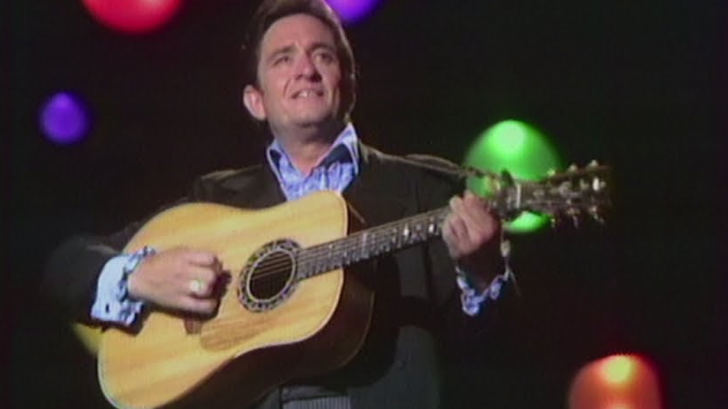Johnny Cash, the iconic Man in Black, was a force to be reckoned with. Yet, as his career reached its twilight years, Cash faced a heart-wrenching battle with Shy–Drager syndrome, a neurodegenerative disease. In 1997, after receiving this devastating diagnosis, he made the difficult decision to retire from touring, but his love for music still burned brightly.
Undeterred by his declining health, Cash continued his musical journey within the confines of the recording studio.
His partnership with renowned producer Rick Rubin gave rise to two remarkable albums that added to his storied career: “American III: Solitary Man” in 2000 and the 67th and final album, “American IV: The Man Comes Around,” in 2002. The latter featured collaborations with luminaries like Don Henley, Nick Cave, and Fiona Apple, along with Cash’s powerful rendition of Nine Inch Nails’ “Hurt.”
In May 2003, tragedy struck when Cash’s beloved wife of 35 years, June Carter, passed away. Grief-stricken, Cash reached out to his producer and confidant, Rick Rubin, the day after June’s death. He implored Rubin to join him in crafting some final musical masterpieces. Over the span of a mere four months, Cash poured his soul into recording 30 songs.
Recalling the heart-wrenching experience, Rick Rubin shared:
“When June died, it tore him up. He said to me, ‘You have to keep me working because I will die if I don’t have something to do.'”
At that point, Cash was already confined to a wheelchair, and they set up a makeshift studio at his Virginia home. Rubin revealed that he couldn’t bring himself to listen to those recordings for two years after Cash’s passing.
View this post on Instagram
The fruits of their poignant collaboration emerged as two posthumous albums: the “Unearthed” box set and the 2006 release “American V: A Hundred Highways.”
The latter featured two original compositions by Cash himself: “I Came to Believe” and “Like the 309.”
“Like the 309” holds a unique place in Cash’s catalog, encapsulating his lifelong fascination with trains. His first song in 1955, “Hey Porter,” painted a vivid picture of a train journey and a conversation with a railway employee. This enduring fascination led Cash to release two train-themed albums in the 1960s: “Ride This Train” in 1960 and the 1962 compilation “All Aboard the Blue Train with Johnny Cash.”
“Like the 309” serves as a poignant bookend to “Hey Porter.” It revolves around a final train journey, symbolizing Cash’s journey toward mortality and his Tennessee roots. The song takes place at yet another train depot, where Cash reflects on his last ride aboard the 309 train.
Despite his retirement from touring and his deteriorating health, Johnny Cash graced the stage one final time on July 5, 2003.
This poignant performance took place at the Carter Family Fold concert hall in Hiltons, Virginia. Seated in a chair with his trusty guitar, Cash delivered heartfelt renditions of classics like “Folsom Prison Blues,” “I Walk the Line,” and “Sunday Mornin’ Comin’ Down.”
In a deeply emotional moment, he shared his feelings about June Carter, who had passed away just two months prior at the age of 73. Cash’s words resonated with the audience:
“The spirit of June Carter overshadows me tonight with the love she had for me and the love I have for her. We connect somewhere between here and heaven. She came down for a short visit, I guess, from heaven to visit with me tonight to give me courage and inspiration like she always has. She’s never been one for me, except courage and inspiration. I thank God for June Carter. I love her with all my heart.”
Johnny Cash’s final song, “Like the 309,” encapsulates the profound emotions he experienced in his last days, leaving an enduring legacy that continues to touch the hearts of fans worldwide.

